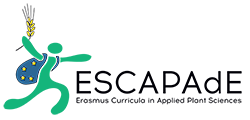English title:
Plant breeding - principles and methods
Course ID:
957320
ECTS credits:
3,0
Title in native language:
Plant breeding - principles and methods (in Eng.)
Plant breeding - principles and methods (in Eng.)
Term Semester:
Autumn/Winter
Instruction language(s):
English
Course content:
In 12 topics an overview on the scientific basis of modern plant breeding and crop improvement will be presented.
Attending the practical course (957321) is highly recommended!
Attending this lecture will allow you to understand the follow up lecture 'Field Crops Breeding' (957307) in the summer term
Mayor course topics
* Introduction into the subject plant breeding
* From monogenic to polygenic inheritance: the genetic principles for plant breeding - a little bit of replication
* The origin of genetic variation: gene-, chromosome- and genome mutations
* The propagation systems determine the breeding methods
* Genes and alleles in populations: principles of population genetics for plant breeders
* The value of genes: principles of quantitative genetics 1: measures for genetic values [additive, dominant and epistatic gene action]; breeding value.
* The value of genes: principles of quantitative genetics 2: genotypes and environments, heritability coefficient
* Make your choice: gain by breeder's selection
* Breeding goals: yield, quality, resistance, and more
* Biotechnology: about genetic markers, transgenic crops and gene-editing
* Genetic resources: treasure for plant breeding
* How is a practical breeding station organized?
* Who is doing plant breeding? | Different options in different parts of the world
.
Attending the practical course (957321) is highly recommended!
Attending this lecture will allow you to understand the follow up lecture 'Field Crops Breeding' (957307) in the summer term
Mayor course topics
* Introduction into the subject plant breeding
* From monogenic to polygenic inheritance: the genetic principles for plant breeding - a little bit of replication
* The origin of genetic variation: gene-, chromosome- and genome mutations
* The propagation systems determine the breeding methods
* Genes and alleles in populations: principles of population genetics for plant breeders
* The value of genes: principles of quantitative genetics 1: measures for genetic values [additive, dominant and epistatic gene action]; breeding value.
* The value of genes: principles of quantitative genetics 2: genotypes and environments, heritability coefficient
* Make your choice: gain by breeder's selection
* Breeding goals: yield, quality, resistance, and more
* Biotechnology: about genetic markers, transgenic crops and gene-editing
* Genetic resources: treasure for plant breeding
* How is a practical breeding station organized?
* Who is doing plant breeding? | Different options in different parts of the world
.
Expected previous knowledge:
Completion of the bachelor courses 'Pflanzenzüchtung' [957106] and 'Genetik (AW)' [941112] and or similar courses is highly recommended!<br>General knowledge about classical and molecular genetics is required.<br>General knowledge about applied statistics is of advantage<br><br>.
Learning outcomes:
This course provides you with the terminology and with comprehensive knowledge needed for the scientific discipline plant breeding. You will learn how plant genetics and plant breeding are related and how quantitative genetics and selection theory are related. You will learn about ideas to enhance selection gain and how to cope with genotype-by-environment interaction. You will learn that the propagation system of a crop plant influences the choice of the appropriate breeding methods. You will know about biotechnological tools in plant breeding. You will learn about maintenance and utilization of genetic resources. You will understand and be able to explain a range of diverse terms, such as allele frequency, selection gain, breeding value, participatory breeding, chromosomal translocation, … to mention just a few.
After successful completion of this course you will be able to:
* speak and understand the language of this discipline
* discuss ‘plant breeding’ with experts and with laymen
* have the knowledge base for a master thesis in plant breeding
* have the knowledge base for enjoying the course ‘Spezielle Pflanzenzüchtung' = 'Field Crops Breeding' [957307] in the summer semester
* have the knowledge base to start scientific breeding research or practical breeding yourself
.
After successful completion of this course you will be able to:
* speak and understand the language of this discipline
* discuss ‘plant breeding’ with experts and with laymen
* have the knowledge base for a master thesis in plant breeding
* have the knowledge base for enjoying the course ‘Spezielle Pflanzenzüchtung' = 'Field Crops Breeding' [957307] in the summer semester
* have the knowledge base to start scientific breeding research or practical breeding yourself
.
Teaching and learning methods:
Lecture with power point slides
Slides will be made available online
Discussions are encouraged and welcome
.
Slides are available in the BOKU e-Learing system moodle
Slides will be made available online
Discussions are encouraged and welcome
.
Slides are available in the BOKU e-Learing system moodle
Exam method:
20 questions which require short answers, duration about 2 hours.
List of example questions available through the e-learning course webpage
.
List of example questions available through the e-learning course webpage
.
Organisation: University of Natural Resources and Life Sciences Vienna
Country:
Austria
Acronym:
BOKU
ERASMUS+ code:
A WIEN03
Teaching period summer semester:
22. Feb 2021 - 30. Sep 2021
Teaching period winter semester:
13. Oct 2020 - 21. Feb 2021
University website:
